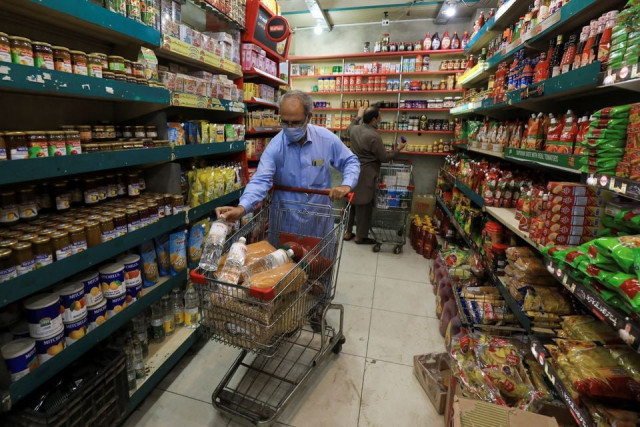Inflation to stay in double digits in Dec
Finance ministry says it will be slightly less than previous month’s reading

The Ministry of Finance said on Monday that the inflation rate would stay in double digits for the second consecutive month in December but it remained shy of giving a number ahead of approval of a highly inflationary mini-budget.
“The low base effect may contribute to keep inflation rate of December in double digit,” said the Ministry of Finance in its monthly economic outlook report for December.
However, for the first time, the ministry did not give a projection and only said that “inflation is expected to remain in double digit in December but slightly less than the last month’s number”.
In November, the inflation rate had soared to 11.5% due to the government’s decision to increase prices of commodities, electricity, fuel and the central bank’s reckless policy to let the rupee depreciate.
Information Minister Fawad Chaudhry said that the government would seek cabinet’s approval for mini-budget on Tuesday (today) and it would be laid before the National Assembly later.
The mini-budget is the condition of the IMF to take Pakistan’s request for $1 billion loan on January 12 to its executive board.
According to The Express Tribune’s report, about Rs360 billion worth of taxes will be imposed, which include Rs355 billion in indirect and highly inflationary general sales tax-related measures.
These have the potential to fuel inflation and keep it in double digits for a longer period, as the general sales tax is being proposed on almost every essential commodity, including the food items being sold at bakeries, packaged dairy products and infant milk.
The Ministry of Finance said that the major contributor to inflation in recent months had been “higher global commodity prices, electricity charges, house rent and transportation cost”.
“The price adjustments were directly and indirectly induced by recent exceptional increase in international commodity prices and exchange rate movements,” said the ministry.
The government had apparently removed former finance minister Dr Abdul Hafeez Shaikh on charges that he failed to contain inflation. The PTI also faced a humiliating defeat in local government elections in Khyber-Pakhtunkhwa on what the party members said was because of high inflation in the country.
Shaukat Tarin on Monday took oath of finance minister after being elected as a senator from Khyber-Pakhtunkhwa. Tarin belongs to Punjab.
The finance ministry said that it was expected that the monthly inflation rate, which had hit 13-year high level last month, “will soften in December”.
International oil prices had retreated somewhat from previous highs and the exchange rate continued to slightly depreciate but government efforts to dampen the pass-through of high international food prices into domestic retail markets continued, it added.
The ministry made rosy projections for economic growth but said that inflationary pressures and the consequent tightening of policies may dampen growth prospects.
The average Monthly Economic Indicator for the first five months of current fiscal year indicates that average economic growth during this period may be estimated at around 5%, according to the report.
It said that despite the spread of Omicron variant, there was demand for Pakistani exports by the trading partners. “But we should also not ignore the impending risks including the concerns of policymakers about the inflationary effects and the resulting policy response.”
The new variant and global inflationary pressures were the key concerns and they were making the economic outlook more difficult, said the finance ministry.
It said that after three years, the current account deficit during July-November period was recorded at $7.1 billion mainly due to import of vaccines, necessary food items to build strategic reserves and energy.
But the fiscal accounts have continued to improve, reflecting the government’s commitment to prudent expenditure management and effective revenue mobilisation strategy.
This is reflected from the fact that net federal revenue receipts climbed 17.4% to Rs1.2 trillion in the July-October period, up from Rs1.1 trillion during the same period of last year.
There was a significant rise of 36.7% in the Federal Board of Revenue’s (FBR) tax collection and 5.4% increase in non-tax collection.
Total expenditure, on the other hand, increased 11.7% to Rs2.2 trillion in July-October of current fiscal year, compared to nearly Rs2 trillion last year. The increase has been witnessed owing to 8.5% increase in current expenditure and 55.6% growth in PSDP spending.
Consequently, the overall fiscal deficit shrank to 1.1% of GDP, or Rs587 billion, in the first four months of FY22, down from 1.7%, or Rs775 billion, recorded in the same period of last year.
However, the ministry did not give the federal budget deficit figure, which is the real barometer of public finances.
Published in The Express Tribune, December 28th, 2021.
Like Business on Facebook, follow @TribuneBiz on Twitter to stay informed and join in the conversation.



















COMMENTS
Comments are moderated and generally will be posted if they are on-topic and not abusive.
For more information, please see our Comments FAQ